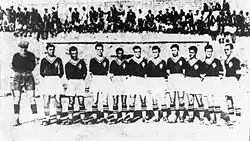Piraeus derby
The Piraeus derby, is an association football rivalry between Ethnikos Piraeus and Olympiacos, the 2 teams representing the city of Piraeus.
| Locale | Piraeus, Greece |
|---|---|
| Teams | Ethnikos Piraeus Olympiacos F.C. |
| Statistics | |
| Most wins | Olympiacos F.C. |
Once a major derby, since Olympiakos' dominance the derby has lost importance over the years, however the rivalry still exists as the poaching of players and the ownership of the stadium still remain a point of contention.
Although the importance of the derby has declined in football, the rivalry is still very much alive in other sports, especially water polo.

History
Since the two clubs were established in the mid-1920s, Ethnikos' traditional local rival has been Olympiacos CFP, one of the two most popular and successful multi-sport clubs in Greece along with Panathinaikos.[1][2]
While a legitimate rivalry between Ethnikos and Olympiacos still exists in water polo (Ethnikos Piraeus Water Polo Club has won the most Greek water polo championships of any club, while Olympiacos Water Polo Club has won the second-most),[3] that is no longer the case in football.
Ethnikos and Olympiacos F.C. were more or less evenly matched and had great battles for Piraeus supremacy in the 1920s and 1930s,[4] but thereafter Olympiacos became increasingly more powerful and successful and began to pass Ethnikos by.
Along the way, Olympiacos developed a habit for luring Ethnikos' best players, like Greek national team players Philippos Kourantis in the late 1920s, Giannis Chelmis in the late 1930s and Giannis Ioannou in the early 1950s.[5]
In 1956–57 Olympiakos was seemingly behind a scandal that robbed Ethnikos of the national championship. Ethnikos was favorite for the title with 4 matches left in the season, and had the derby with Olympiacos next on the schedule; but before the derby arrived Ethnikos was dubiously disqualified from the competition. With Ethnikos out of the way Olympiakos ultimately took the Championship.[4]
In 1973 Ethnikos lost the great Michalis Kritikopoulos to Olympiakos, just a year before Ethnikos mounted its greatest challenge for the national championship in the modern era; many Ethnikos fans feel that if they still had Kritikopoulos, the team would have managed to hold on to 1st place rather than run out of gas in the second half of the 1974–75 season.[5]
Olympiakos ultimately became the dominant football club in Greece, having won the League and Cup more than any other club,[1][2] and Ethnikos has not been able to seriously compete with them for decades. Ethnikos has not defeated Olympiakos in a league match since the 1985–86 season and has not finished above Olympiakos in the league standings since the 1987–88 season.
In the 1990s, when Olympiacos was experiencing probably the greatest era of its history while Ethnikos was suffering through what was surely its worst, Ethnikos lost some of its fanbase to Olympiakos.
A recent point of contention for Ethnikos fans has to do with Karaiskakis Stadium. Karaiskakis is the traditional home of both Olympiakos and Ethnikos,[6] but only Olympiacos has played there since the stadium was rebuilt for use in the 2004 Summer Olympics.[7]
References
- "All Time Champions". Hellenic Football Federation. Archived from the original on December 11, 2009.
- "Greek Cups Winners". Hellenic Football Federation. Archived from the original on 2008-10-03.
- "Olympiacos 2008 Champion". water-polo.gr. 2008-05-02. Archived from the original on 2009-08-05. Retrieved 2015-12-14.
- "Greece – Final Tables 1906–1959". rsssf.com. 2004-08-01.
- "All time Ethnikos teams". Ethnikara.com. Archived from the original on 2007-10-16.
- "Velodrome & Karaiskaki Stadium (1895 – 1964 – 2003)". Stadia.gr.
- "Georgios Karaiskakis Stadium". Stadia.gr.